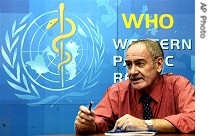2007年VOA标准英语-New Bird Flu Outbreaks Raise Alarm in Asia(在线收听)
Hong Kong
15 January 2007
Rising numbers of human bird flu deaths in Indonesia and avian flu outbreaks among poultry in several Asian countries have put the region on alert. The World Health Organization says Asia, Africa, even Europe, need to be prepared for the worse. Claudia Blume reports from VOA's Asia News Center in Hong Kong.
Vietnamese authorities reported on Monday that bird flu has spread to a seventh province in the country's south. Avian flu outbreaks have led to the killing of tens of thousands of birds in Vietnam's Mekong delta in the past month.
Thai livestock officials say they have just culled ducks in a northern province, the first flu outbreak in poultry in six months.
In Japan, agricultural authorities began culling thousands of chickens at a southern poultry farm on Sunday after tests found they were infected with bird flu. In Hong Kong, a dead bird suspected of having the H5N1 strain of avian influenza was found last Saturday, the second in two weeks.
Bird flu has also claimed human lives. Four people died of avian influenza in Indonesia last week. The son and husband of one the victims are being treated for symptoms of bird flu. Officials say, however, that there is no evidence of human-to-human transmission.
 |
| Peter Cordingley (file photo) |
"We are prepared to see basically a repeat of last year and we wouldn't be surprised at all to see the other thing last year which is this virus getting on the move," he explained. "Last year it moved out of Asia and moved into the Middle East and Europe and parts of Africa. We have seen human cases in Egypt already, outbreaks in poultry in northern Niger already - so we suspect that it would be foolish to vote against this virus not doing exactly the same it did last year."
Cordingley urges continued education about the dangers of living in close proximity to infected poultry, particularly in Indonesia, where more than 60 people have already died of avian influenza.
Many Asian countries are now better prepared than they were a year ago however. Denis Hoffman is a bird flu expert at the United Nations Food and Agricultural Organization in Bangkok. He says surveillance and containment mechanisms have improved tremendously.
"And even the countries that haven't had the disease yet, they have had assistance in preparing their contingency plans, looking at their imports and exports to make sure that they don't get the disease coming in through the trade of poultry products, which is probably one of the major reasons for its spread," he said.
Bird flu featured prominently at the meeting of the Association of South East Asian Nations in Manila. Leaders endorsed a bird flu-prevention "road map" aimed at sharing best practices in the region.